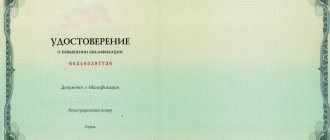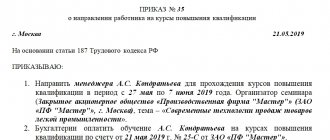Additional education system
Additional professional education (hereinafter referred to as APE) is the process of training medical personnel in additional educational programs outside of the main educational programs.
In the Russian Federation there are three main types of additional education:
- Training;
- Internship;
- Professional retraining.
Advanced training and professional retraining of medical personnel are carried out in accordance with Order of the Ministry of Health of Russia dated August 3, 2012 No. 66n “On approval of the Procedure and timing for improving professional knowledge and skills by medical workers and pharmaceutical workers through training in additional professional educational programs in educational and scientific organizations” (hereinafter referred to as text - Order No. 66n).
Advanced training of medical workers - laws and regulations of the Labor Code of the Russian Federation
In matters of advanced training of medical workers, both the employees themselves and their employers first of all need to familiarize themselves with the current legal framework, which in this context is quite extensive. In particular, all persons involved in these labor relations should pay attention to the following standards of the Labor Code:
- Article 168 of the Labor Code of the Russian Federation. The provisions disclosed in this article establish the employer’s obligation to pay the employee’s travel expenses in the form of travel allowances. These payments are also provided when an employee travels outside his place of work and residence to improve his qualifications.
- Article 187 of the Labor Code of the Russian Federation. This article regulates the procedure for employers to pay for advanced training and professional education of employees, as well as other additional guarantees retained by employees of all business entities for the period of training.
- Article 195.1 of the Labor Code of the Russian Federation. This article regulates the concept of qualifications of workers in general, without reference to specific areas of activity.
- Article 196 of the Labor Code of the Russian Federation. The principles of this article establish the basic rights and obligations of the employer related to the professional education of employees, their training, retraining and advanced training.
The Labor Code of the Russian Federation does not directly provide for advanced training of medical workers as a separate category of personnel. However, the Labor Code of the Russian Federation provides for the possibility of regulating this issue with separate regulatory documents and acts.
Similar additional documents that directly affect the completion of advanced training courses for paramedical workers, junior and management staff of healthcare institutions include the following regulations and laws:
- Federal Law No. 323 of November 21, 2011. This legislative document regulates the general fundamental principles of the work of healthcare institutions in the Russian Federation. Among other things, they directly address the mandatory need for regular improvement of knowledge and practical skills by medical staff, which consists in regularly undergoing advanced training for medical workers.
- Order of the Ministry of Health of the Russian Federation No. 66n dated August 3, 2012. This document regulates the immediate procedure for medical workers to undergo training and improve their qualifications, as well as the timing associated with these procedures.
- Decree of the Government of the Russian Federation No. 291 of April 16, 2012. This document regulates the procedure for licensing medical activities on the territory of the Russian Federation as a whole, including in matters of compliance of employees of medical institutions with certain regulatory requirements.
If you read all the above-mentioned regulations, you can understand that advanced training of medical workers is, from a legal point of view, a mandatory procedure that both employers and employees must follow.
The requirements for the qualifications of medical workers and for their mandatory regular improvement are the same for both employees of budgetary institutions and employees of private medical organizations, including pharmacies and dentists.
Advanced training of medical personnel
Advanced training is a type of additional professional training aimed at updating the theoretical and practical knowledge of medical personnel in connection with increasing requirements for the level of qualifications and the need to master modern methods of solving professional problems and does not end with an increase in the level (stage) of education.
Advanced training is carried out at least once every five years (clause 4 of Order No. 66n).
How to become a student of advanced training courses for nursing staff
Advanced training and retraining of nurses in Moscow is available to residents of the regions. For enrollment, provide the following documents:
- diploma;
- certificates;
- certificates of completion of courses.
There is no entrance exam. Each registered nurse has access to the skills and knowledge necessary to care for all patients requiring the services of a mid-level staff member. The student chooses a comfortable format for acquiring knowledge: face-to-face or remotely. The courses follow an approved curriculum covering all important aspects of the profession. The disciplines are taught by professionals in the fields of medicine who have academic degrees and are the authors of scientific treatises and monographs. After graduation, a final certification examination is carried out. Those who pass the test receive a standard certificate.
Advanced training includes the following types of training:
- Short-term (at least 72 hours) thematic training on issues of a specific type of activity, which is carried out at the place of the main work of specialists and ends with passing the corresponding exam, test or defense of an essay;
- Thematic and problem-based seminars (from 72 to 100 hours);
- Long-term (over 100 hours) training of specialists in an educational institution for advanced training for in-depth study of current problems in science, technology, technology and other problems in the profile of professional activity .
Professional retraining of medical workers
Professional retraining (hereinafter referred to as retraining) is a type of additional professional training aimed at students mastering educational programs to perform a new type of work or group of work. Retraining does not provide a new level of education in accordance with state educational standards, but it makes it possible to change the direction of professional activity at the existing level of education.
Based on the results of professional retraining, specialists receive a state-issued diploma certifying their right (qualification) to conduct professional activities in a certain field. The direction of professional retraining is determined by the customer in agreement with the educational institution for advanced training .
Professional retraining is also carried out to expand the qualifications of medical personnel in order to adapt them to new economic and social conditions and conduct new professional activities, including taking into account international requirements and standards.
As a result of professional retraining, a specialist may be assigned additional qualifications based on the acquired specialty. Professional retraining to obtain additional qualifications is carried out through the development of additional professional educational programs.
Some questions related to advanced training
Question: Is it necessary to stipulate the obligation to improve qualifications every five years in the employment contract with medical workers? By virtue of Art. 57 of the Labor Code of the Russian Federation, the employment contract must include the following conditions: - about the place of work; — about the labor function; — about the start date of work; — on the validity period of a fixed-term employment contract; - about wages; - about the working hours and rest hours (if for a given employee it differs from the general rules in force for a given employer); - on compensation for hard work and work with harmful and (or) dangerous working conditions, if the employee is hired in appropriate conditions, indicating the characteristics of working conditions in the workplace; — about the nature of the work (mobile, traveling, on the road, etc.); — on compulsory social insurance; — other conditions in cases provided for by labor legislation and other regulatory legal acts containing labor law norms. Additional conditions may be provided that do not worsen the employee’s position, including those that clarify, in relation to the conditions of his work, the rights and obligations of the employee and the employer established by labor legislation and other regulatory legal acts containing labor law norms. By agreement of the parties, the employment contract may also include the rights and obligations of the employee and employer established by labor legislation and other regulatory legal acts containing labor law norms, local regulations, as well as the rights and obligations of the employee and employer arising from the terms of the collective agreement and agreements . Failure to include any of the specified rights and (or) obligations of the employee and employer in the employment contract cannot be considered as a refusal to exercise these rights or fulfill these obligations. Neither the Labor Code of the Russian Federation nor other laws provide for the direct obligation of an employee to improve their qualifications once every five years; only the right of the employee is provided (Article 197 of the Labor Code of the Russian Federation) and the obligation of the employer in cases provided for by federal laws and other regulatory legal acts of the Russian Federation, to carry out advanced training employees, if this is a condition for them to perform certain types of activities (Article 196 of the Labor Code of the Russian Federation). Thus, the employer decides whether to include in the text a condition regarding the employee’s obligation to undergo advanced training once every five years. In the author’s opinion, it is better to do this so that all employees hired for a particular position know and remember that if they refuse to take advanced training courses in order to confirm a specialist certificate, they will lose the right to engage in medical activities and the employer will fire them . In addition, according to Part 2 of Art. 197 of the Labor Code of the Russian Federation, the employee’s right to professional training, retraining and advanced training is implemented by concluding an additional agreement between the employee and the employer, which stipulates in more detail the procedure and conditions for advanced training.
Question: Is an employer required to pay for advanced training courses for an employee? Indeed, as practice shows, some employers offer employees to undergo advanced training at their expense or with 50% payment for the cost of the courses. And those who want to continue working often accept the employer’s conditions. However, in Art. 72 of the Fundamentals clearly states that professional training, retraining and advanced training are carried out at the expense of the employer. In addition, for persons undergoing vocational training, the employer must create the necessary conditions for combining work with training, provide guarantees established by labor legislation and other regulatory legal acts (Article 196 of the Labor Code of the Russian Federation), namely when the employer sends an employee for advanced training from work, he retains his place of work (position) and the average salary at his main place of work. Those sent to improve their qualifications while away from work in another area are paid for travel expenses in the manner and amount that are provided for persons sent on business trips (Article 187 of the Labor Code of the Russian Federation). Judicial practice on this issue has not yet developed. Thus, guided by the current legislation, the employer is obliged to pay the employee for professional training, retraining and advanced training. The only thing that can be advised to the employer is to stipulate in the additional contract the employee’s working period after completing the courses, as well as his obligation to reimburse the employer for the cost of training in case of early dismissal and other similar conditions. In addition, Art. 249 of the Labor Code of the Russian Federation establishes that in the event of dismissal of an employee without good reason before the expiration of the period stipulated by the employment contract or agreement on training at the expense of the employer, the employee is obliged to reimburse the costs incurred by the employer for his training, calculated in proportion to the time actually not worked after completion of training, unless otherwise provided by the employment contract or training agreement.
Question: What documents must an employer prepare in connection with an employee’s completion of advanced training courses? According to clause 2.4 of Regulation No. 808n, the head of the organization must create annual lists of employees who want to receive a certain category next year. The same lists, as a rule, are formed for continuing education courses. The lists are sent to the educational institution, with which the terms and procedure for completing the courses are agreed upon. A training contract is drawn up with each employee in writing, on the basis of which the employer issues an order in any form to send the employee(s) for advanced training. After completing the training and upon presentation by the employee of a document confirming completion, a corresponding entry is made in the employee’s personal card (unified form T-2). In addition, a record of the time spent studying in advanced training courses is entered in the work book, for example: “From 04/12/2012 to 04/28/2012 I took training in advanced training courses.” In the “Bases” column the date and number of the certificate are indicated.
Question: Does an employer have to notify an employee that their specialist certificate is expiring? What to do if he was not warned and the deadline has expired? This issue is not regulated by labor legislation, so it is difficult to say who should prevent the expiration of the certificate - the employee or the employer. But it is in the interests of the employer that licensing rules are not violated in his organization. The consequence of a violation may be loss of license. Therefore, it is necessary to keep clear records and control of the validity periods of employee certificates, to notify in advance about the expiration of the certificate and the dates when they can take advanced training courses. At the same time, we should not forget about employees on maternity leave, child care leave, on a long business trip, etc. If it turns out that they forgot to notify the employee and the validity period of the specialist’s certificate has expired, he does not have the right to engage in medical activities. But the employer cannot remove him from work, since this basis for removal is not provided for by the Labor Code of the Russian Federation. In this case, before the employee confirms the certificate, the employer may offer him, by agreement of the parties, a transfer to another position not related to medical activities. If there is no such position, by agreement with the employee, you can let him go on annual leave. In any case, the employer is unlikely to be able to fire such an employee. Another question is if an employee refuses to take advanced training courses. Then you can fire him under clause 9, part 1, art. 83 of the Labor Code of the Russian Federation - in connection with the expiration, suspension of validity for a period of more than two months or deprivation of a special right (license, right to drive a vehicle, the right to carry a weapon, other special right) in accordance with federal laws and other regulatory legal acts RF, since this entails the impossibility of the employee fulfilling his duties under the employment contract. Before dismissing him, the employer must also offer him a transfer to another position, and upon dismissal, provide evidence that the employee himself refused to undergo advanced training and transfer.
Additional education for nursing staff of a medical institution
Another important document regarding advanced training of paramedical personnel is Order of the Ministry of Health of the Russian Federation dated 06/05/1998 No. 186 “On advanced training of specialists with secondary medical and pharmaceutical education.” This document enshrines the List of cycles of specialization and improvement in the system of additional education of nursing personnel.
The named List in the form of a table contains information on the frequency (at least once every 5 years), duration and type of postgraduate education at the end of a certain subject cycle. One or more topics for advanced training are established for certain categories of specialists and positions of workers with secondary medical or pharmaceutical education.
However, it is worth remembering that the aforementioned Order of the Ministry of Health No. 186 does not have the status of a normative legal document, therefore the demands of some officials of supervisory authorities regarding its exact implementation are not legitimate.
How to confirm qualifications for medical workers in the Moscow region
The issue of continuous professional development is relevant for every practicing medical specialist - both for a doctor and for a nurse or emergency medical assistant. This is necessary so that the quality of medical care they provide does not lag behind the requirements of the time. After training, the specialist must undergo certification. Read about how medical workers can confirm their qualifications in the Moscow region in the material from the mosreg.ru portal.
Employment centers of the Moscow region. Map>>
Who can receive government services
Source: RIAMO, Nikolay Koreshkov
Those wishing to confirm their medical qualifications have the right to receive the appropriate government service. It is provided free of charge.
The service for assigning and confirming qualification categories of specialists is intended for medical workers who work in the healthcare system of the Moscow region and have the right to receive or confirm a qualification category.
Certification of workers is carried out for positions that are included in the list of positions for medical and pharmaceutical workers. It is voluntary and is carried out in three qualification categories: second, first and highest.
Employment of disabled people in the Moscow region: vacancies and special conditions>>
Procedure and terms of service provision
Source: Photobank of the Moscow region, Roman Vartsev
To receive the service, you must personally submit an application and a set of documents to the Moscow Regional Medical College No. 1, to the multifunctional service center (MFC)
The result of the provision of the service is the assignment of a qualification category, or the refusal to provide the service.
How to get help in hiring employees for a Russian employer in the Moscow region>>
Required documents
Source: RIAMO, Anastasia Osipova
The applicant must submit:
— a copy of the identity document;
— an attestation sheet of the established form, certified by the signature and seal of the personnel department, the signature of the head of the organization and the seal of the organization;
- a report on professional activities for the last 3 years of work, agreed with the manager and certified by the seal of the organization carrying out medical or pharmaceutical activities, of which the applicant is an employee;
— a copy of the document on assignment (confirmation) of the qualification category;
— a copy of the work book;
— a copy of the certificate of advanced training in the certified specialty for the last 5 years;
— a copy of the specialist’s certificate in the certified specialty;
— a copy of a diploma of higher professional education;
— a copy of the professional retraining diploma;
— a copy of the certificate of completion of the internship (residency).
Documents will not be accepted from those applicants for whom a decision was made about non-compliance with the qualification category after passing the qualification exam (less than a year from the current date).
How to get vocational training services for unemployed citizens in the Moscow region>>
Basic requirements for organizing additional vocational training
The timing, forms, content and technology of training medical personnel in additional professional education programs are determined by educational and scientific organizations implementing the relevant educational program, independently taking into account the requirements of federal state educational standards of secondary and higher vocational education, federal state requirements for postgraduate professional education programs in the relevant direction of training (specialty).
The need for employees to undergo advanced training, professional retraining and internship is established by the employer.
Professional retraining is mandatory for workers planning to perform a new type of medical activity.
Advanced training, professional retraining and internships for employees are carried out mainly off-the-job, part-time, and through individual forms of training.
The duration of the internship is established by the employer sending the employee for training, based on its goals and in agreement with the head of the educational or scientific organization where it is conducted.
A convenient form of acquiring knowledge for residents of all regions of the country
Our center provides the opportunity to obtain the necessary knowledge with the issuance of a standard diploma. Advanced training for nurses and professional retraining help nursing staff with different levels of training and experience in any region of the country master a range of information and skills. For this purpose, we have developed the following forms of training:
- daytime;
- remote;
- correspondence
Studying takes place without interruption from work, at a time convenient for the student. The series of classes is interesting for nurses with extensive work experience, those who have recently entered the profession or have not worked in their specialty for a long time. The emphasis is on practical training, mastering and consolidating skills needed in the future.
New rules for conducting additional training
It is worth noting that to replace the Decree of the Government of the Russian Federation dated June 26, 1995. No. 610 “On approval of the standard regulations on an educational institution for additional professional education (advanced training) of specialists” came a new Order of the Ministry of Education and Science of Russia dated July 1, 2013 No. 499 “On approval of the Procedure for organizing and implementing educational activities in additional professional programs.” It made a number of changes to rules for organizing additional vocational training, in particular, reduced the minimum number of hours of training within the framework of advanced training (PC) and professional retraining (PP). Now they are: a minimum of 16 hours for PC and 250 hours for software. However, these rules “do not work” within the framework of additional professional education in the healthcare sector. This is obviously confirmed by new educational programs issued by Orders of the Russian Ministry of Health starting in 2014 (for example, Order of the Russian Ministry of Health dated January 22, 2014 No. 36n “On approval of exemplary additional professional medical education programs in the specialty “Geriatrics””).
Follow us
Subscribe to the newsletter and be the first to receive the latest and most relevant information from the Faculty of Medical Law.
By submitting an application, you agree to the terms of processing and use of personal data.
Clarifications on certification according to Order of the Ministry of Health dated April 14, 2020 No. 327n
The Ministry of Health of the Russian Federation in connection with numerous requests regarding the application of the order of the Ministry of Health of Russia dated April 14, 2020 No. 327n “On the peculiarities of admission of individuals to carry out medical activities and (or) pharmaceutical activities without a specialist certificate or a certificate of accreditation of a specialist and (or ) in specialties not covered by a specialist certificate or specialist accreditation certificate” reports the following. In connection with the threat of the spread of the new coronavirus infection COVID-19, Federal Law No. 98-FZ was adopted on April 1, 2020 “On amendments to certain legislative acts of the Russian Federation on the prevention and response to emergency situations” (hereinafter referred to as Federal Law No. 98- Federal Law). Within the framework of the powers established by subparagraph “e” of paragraph 2 of part 1 of Article 17 of Federal Law No. 98-FZ, the Government of the Russian Federation issued Resolution No. 440 dated April 3, 2020 “On the extension of permits and other features regarding licensing activities in 2020” (hereinafter referred to as Resolution No. 440). According to paragraph 2 of Appendix No. 9 of Resolution No. 440, the Russian Ministry of Health approved Order No. 327n dated April 14, 2020, according to which a moratorium is introduced on obtaining specialist accreditation certificates and (or) specialist certificates, the validity of specialist certificates is extended by 12 months, and also determines the cases and conditions under which the admission of individuals to carry out medical or pharmaceutical activities is possible without the presence of these documents. In terms of clarification of the provisions of Order No. 327n, we explain the following. 1. Paragraph 2 of Order No. 327n establishes a moratorium until January 1, 2021 on obtaining specialist certificates and specialist accreditation certificates, including by persons who have been accredited as a specialist. Thus, before January 1, 2021, carrying out procedures for the accreditation of specialists and the certification exam (including submitting an application and documents for passing these procedures, reviewing submitted documents, passing these procedures by specialists, holding meetings of the relevant commissions and subcommittees) is inappropriate due to the fact that the issuance of specialist accreditation certificates and specialist certificates based on the results of these procedures will not be carried out, and the possibility of carrying out professional activities without the specified documents is established by paragraph 1 of the appendix to order No. 327n. Persons who were accredited as a specialist before Order No. 327n came into force (i.e. before April 25, 2020 inclusive) and did not receive a certificate of accreditation of a specialist will not be issued such a certificate until January 1, 2021. Upon expiration of Order No. 327n ( after January 1, 2021) to persons who have passed the accreditation of a specialist, but have not received a certificate of accreditation of a specialist, such certificates are issued without re-going through the stages of specialist accreditation in the manner prescribed by orders of the Ministry of Health of Russia dated June 2, 2020 No. 334n “On approval of the Regulations on accreditation of specialists" (hereinafter referred to as the Regulations on the accreditation of specialists) and dated June 6, 2020 No. 352n "On approval of the procedure for issuing a certificate of accreditation of a specialist, the form of a certificate of accreditation of a specialist and technical requirements for it." 2. Paragraph 3 of Order No. 327n establishes that specialist certificates, the validity of which expires in the period from April 6, 2020 inclusive (the date of entry into force of Order No. 440), are extended for 12 months from the date of expiration of their validity (i.e. ., for example, if the certificate expires on April 27, 2020, then it is extended until April 27, 2021 inclusive). In this case, obtaining a new specialist certificate or taking other actions to extend its validity period on the part of medical and pharmaceutical workers is not required. 3. The Appendix to Order No. 327n establishes cases and conditions for the admission of individuals to carry out medical activities and (or) pharmaceutical activities without obtaining a specialist certificate or a specialist accreditation certificate, which are applied in case of an emergency and (or) when there is a threat of the spread of a disease, posing a danger to others, until January 1, 2021 (hereinafter referred to as the appendix to order No. 327n). 4. In accordance with subparagraph “a” of paragraph 1 of the appendix to order No. 327n, admission of persons who have completed training in higher medical and pharmaceutical education programs (bachelor’s, specialty, residency), secondary vocational education and additional vocational education (professional retraining, advanced training) , in the period until January 1, 2021, is carried out without a specialist accreditation certificate and a specialist certificate, as well as without passing a specialist accreditation and passing a certification exam. Admission of these persons to medical and (or) pharmaceutical activities is carried out by specialty in accordance with the received educational documents (i.e., for example, a person who has completed training in a residency program in the specialty “Cardiology” is admitted to professional activities in the specialty “Cardiology” "). 5. In accordance with subparagraph “b” of paragraph 1 of the appendix to order No. 327n, persons currently receiving higher medical education in residency programs in one of the specialties of the enlarged group of specialties “Clinical Medicine” (order of the Ministry of Education and Science of Russia dated September 12, 2013 No. 1061) and before completing such training (i.e. passing the State Examination and obtaining a diploma), regardless of the volume of the completed educational program (years of study), they can be employed for the period specified in paragraph 3 of this letter, for the position of a trainee doctor, subject to completion training in short-term additional professional programs (at least 36 hours). These persons carry out medical activities under the supervision of a medical specialist. This rule also applies to persons who will be admitted to residency programs in 2020, from the start of their studies in the 2020/2021 academic year. 6. In accordance with subparagraph “c” of paragraph 1 of the appendix to order No. 327n, persons studying in final courses in secondary vocational education programs in one of the specialties of the enlarged group of specialties “Clinical Medicine” (Order of the Ministry of Education and Science of Russia dated October 29, 2013 No. 1199 ) can be employed as a specialist with a secondary medical education and allowed to carry out medical activities for the period specified in paragraph 3 of this letter, subject to training in short-term additional professional programs (at least 36 hours); employment. These persons carry out medical activities under the supervision of a senior nurse. This rule, among other things, applies from the beginning of the new academic year (from September 1, 2020) to students who will be transferred to graduate courses for study in the 2020/2021 academic year. 7. In accordance with subparagraph “d” of paragraph 1 of the appendix to order No. 327n, persons who have a medical education received in the Russian Federation (confirmed by an appropriate diploma) and who have not worked in their specialty for more than five years can be employed as a trainee doctor (for specialists with higher medical education) or the position of specialist with secondary medical education (for specialists with secondary medical education) and are allowed to carry out medical activities for the period specified in paragraph 3 of this letter, subject to training in short-term additional professional programs (at least 36 hours). 8. After the expiration of the period specified in paragraph 3 of this letter, employed persons admitted to carry out medical and pharmaceutical activities in accordance with subparagraphs “a” - “d” of paragraph 1 of the appendix to order No. 327n, in order to continue carrying out such activities, are subject to passing accreditation of a specialist in the relevant specialty in the manner prescribed by the Regulations on the accreditation of specialists.
Criteria for professional growth
The level of professional training of a doctor can be correlated with the existing requirements for his qualifications on the basis of the following regulatory documents:
- Qualification requirements approved by Order of the Ministry of Health of Russia dated 10/08/2015 No. 707n “On approval of the Qualification requirements for medical and pharmaceutical workers with higher education in the field of training “Healthcare and Medical Sciences”, which began to operate on 11/07/2015 (previously the Order of the Ministry of Health and Social Development of Russia dated 07/07 was in force .2009 No. 415n “On approval of qualification requirements for specialists with higher and postgraduate medical and pharmaceutical education in the field of healthcare”);
- Qualification characteristics of medical workers provided for by the Unified Qualification Directory of Positions of Managers, Specialists and Employees, approved by Order of the Ministry of Health and Social Development of Russia dated July 23, 2010 No. 541n;
- Order of the USSR Ministry of Health dated July 21, 1988 No. 579 “On approval of the qualification characteristics of medical specialists.”
Rules for admission to further education programs
Enrollment in programs of additional professional education (DPE) is carried out in accordance with the admission rules annually approved by educational and scientific organizations (clause 6 of Order No. 66n).
By virtue of clause 8 of the Order on additional professional education of medical workers No. 66n, training under additional professional training programs for workers with secondary and (or) higher medical education that does not meet the qualification characteristics and qualification requirements, but who have continuous practical work experience in the relevant medical specialty of more than five years, organized1:
| Group | Work experience in specialty | Standard number of hours |
| 1 | For specialists with ten years or more experience in their specialty | For any form of training - from 100 to 500 hours of classroom training |
| 2 | For specialists with five to ten years of experience in their specialty | For any form of training - over 500 hours of classroom training |
Advanced training of pharmacy specialists
Source: magazine “Accounting in Pharmacies”, publishing house “Glavbukh”
Since April 10, 2009, the Procedure for Improving the Professional Knowledge of Medical and Pharmaceutical Workers has been in effect, which was approved by the Ministry of Health and Social Development of Russia (Order of the Ministry of Health and Social Development of Russia dated December 9, 2008 No. 705n). Let's talk about the current rules.
What education gives the right to work in a pharmacy The right to engage in pharmaceutical activities is granted to persons who have received a higher or secondary medical education in the Russian Federation, have a diploma and a special title, as well as a specialist certificate and a license to conduct pharmaceutical activities. Please note that the certificate is issued on the basis of postgraduate professional education (residency, etc.), additional education (advanced training, specialization) or a screening test conducted by commissions of professional medical and pharmaceutical associations, on the theory and practice of the chosen specialty, issues of legislation in the field protecting the health of citizens. The general requirements enshrined in the Fundamentals of the Legislation of the Russian Federation on the protection of the health of citizens (approved by the Supreme Council of the Russian Federation on July 22, 1993 No. 5487-1) are specified by the Industry Standard “Rules for the dispensing (sale) of medicines in pharmacies. Basic provisions". It was approved by order of the Russian Ministry of Health dated March 4, 2003 No. 80. By virtue of the direct indication of paragraph 8.4 of this standard, specialists from pharmacy organizations must improve their qualifications in accordance with current requirements. The new Retraining Procedure contains exactly those provisions that managers and pharmacy workers must take into account. Licensing of activities It should be noted that certain requirements are also established by the Regulations on licensing of pharmaceutical activities (approved by Decree of the Government of the Russian Federation of July 6, 2006 No. 416). They boil down to the following. The head of a pharmacy must have a higher pharmaceutical education, work experience in the specialty for at least three years and a specialist certificate. The same requirements apply to individual entrepreneurs. Pharmacy workers whose activities are related to the manufacture, reception, storage, dispensing and sale of medicines must have a higher or secondary pharmaceutical education and specialist certificates. Specialists with pharmaceutical education must improve their qualifications at least once every five years. Strange as it may seem, violation of licensing requirements for personnel in accordance with the Licensing Regulations is not considered a gross violation of licensing requirements and conditions. Largely due to this, as well as due to the rapid growth of the domestic pharmacy network, the emergence of many different pharmacy organizations and the lack of qualified specialists, frequent cases of violations of personnel requirements are explained. For example, the use of workers who do not have the necessary education, violation of the requirement for periodic training, etc. Why the new document was adopted General requirements for citizens who apply to engage in pharmaceutical activities are stipulated in Article 54 of the Fundamentals of Legislation. A feature of such activities is the need for specialists to constantly improve their professional skills. It is no coincidence that when listing the rights of medical and pharmaceutical workers in Article 63 of the Fundamentals of Legislation, the legislator especially highlighted the right to improve professional knowledge. At the same time, it is stipulated that the procedure for their retraining, improving professional knowledge, and obtaining qualification categories is determined by the federal executive body in the field of health care. The procedure for improving the professional knowledge of medical and pharmaceutical workers regulates the rules for organizing professional retraining and advanced training for pharmacy workers who have graduated from higher educational institutions in the “Healthcare” group and are engaged or applying to engage in medical or pharmaceutical activities. Thus, this Procedure is relevant primarily for pharmacy workers with higher education. Objectives of retraining The objectives of retraining and advanced training are determined in accordance with the Model Regulations on the educational institution of additional professional education (advanced training) of specialists, approved by Decree of the Government of the Russian Federation of June 26, 1995 No. 610. During professional retraining, specialists receive additional knowledge, skills and abilities in educational programs necessary to perform a new type of professional activity. In addition, retraining is organized to expand the qualifications of specialists in relation to new economic and social conditions and conduct new professional activities, including taking into account current international requirements and standards. At the same time, professional retraining to perform a new type of activity is carried out on the basis of established qualification requirements for specific positions. Advanced training should lead to updating the theoretical and practical knowledge of specialists in connection with increasing requirements for the level of qualifications and the need to master modern methods for solving professional problems. Such training is carried out as necessary, but at least once every five years throughout the entire working life of employees. The frequency of specialists undergoing advanced training is established by the employer. Where and how to conduct retraining of personnel Retraining and advanced training of specialists is carried out by educational institutions of higher and additional professional education that have state accreditation. Moreover, specialists sent for retraining, as a rule, undergo entrance tests. Such training can be carried out with a break from work (full or partial), without interruption and through individual forms of training. In turn, the terms, forms, content and technology of training are determined by the educational institution. To improve practical skills on the basis of scientific and educational institutions, internships for specialists may be provided as one of the sections of the curriculum. Duration of training depending on length of service The Ministry of Health and Social Development of Russia has established specific terms and types of training for specialists who have work experience in the relevant specialty. If the experience is: – 10 years or more – training is carried out according to advanced training programs with a duration of 100 to 500 hours of classroom training; – from 5 to 10 years – training is carried out according to professional retraining programs, and its standard period is over 500 hours of classroom training; – less than 5 years – professional training is carried out in accordance with the requirements determined by the order of the Ministry of Health and Social Development of Russia dated March 11, 2008 No. 112n “On the nomenclature of specialties of specialists with higher and postgraduate medical and pharmaceutical education in the field of healthcare of the Russian Federation.” According to the general rule established by this order, the training of specialists in basic specialties is carried out through internship and (or) residency training. In relation to the pharmacy sector, by order of the Ministry of Health and Social Development of Russia dated March 11, 2008 No. 112n, three possible specialties are defined: management and economics of pharmacy, pharmaceutical technology, pharmaceutical chemistry and pharmacognosy. They can be obtained by university graduates with a diploma in pharmacy. This order allows for the acquisition of basic specialties through professional retraining to perform a new type of professional activity. This is possible for people holding positions as managers of pharmacy organizations: in the process of retraining, they can receive the main specialty “Pharmaceutical Management and Economics.” The training of specialists is confirmed by documents. The level of professional knowledge, skills and practical skills of specialists who have undergone retraining or advanced training is assessed by the educational institution. At the same time, the development of educational programs ends with mandatory state final certification. Students who have mastered the appropriate educational program and successfully passed the final certification receive a state-issued certificate of advanced training or a diploma of professional retraining. The type of document you receive depends on the program you have mastered. In particular, as a result of retraining, specialists receive a state diploma certifying their right (qualification) to conduct professional activities in this field. In addition, they may be awarded additional qualifications based on their acquired specialty. Such employees can continue to fill positions corresponding to the range of specialties of specialists with higher and postgraduate medical and pharmaceutical education.










